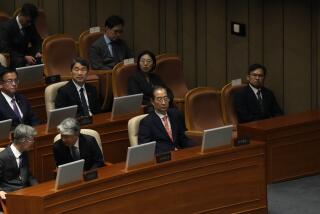Interim Iraqi Leader Says He’ll Refuse Speaker Post
- Share via
BAGHDAD — Negotiators met late into the night Monday but chances appeared remote that they would agree on a new Iraqi government or a speaker for the National Assembly in time for today’s second assembly meeting.
Long-standing plans to introduce outgoing interim President Ghazi Ajil Yawer as speaker of the new National Assembly appeared to hit a snag. Yawer, a prominent Sunni Arab tribal leader, told several Arab satellite TV channels that he intended to refuse the position. He gave no reason for his decision.
The naming of Yawer as speaker was regarded by many as a done deal, and was expected to top the agenda for the one-day assembly session. But Sadik Musawi, an official of the Constitutional Monarchy Movement, said Yawer was determined to refuse a demotion from the presidency and that efforts Monday to persuade him had failed.
Jawad Maliki, a senior official with the Islamic Dawa Party, one of two main partners in the dominant United Iraqi Alliance slate, said Yawer changed his mind after first accepting the speaker post.
Negotiators had hoped to have the entire government, including Cabinet ministers, ready for approval by the first assembly meeting March 16. But continued haggling rendered that occasion purely ceremonial.
The assembly has booked the Baghdad Convention Center hall for only one day for its second session, and a long weekend begins Thursday because of a Shiite Muslim holy day. The alliance’s all-Shiite leadership will probably declare a break in negotiations. Kurds are the other major electoral bloc, and Kurdish officials typically head north for the holiday.
Besides assembly speaker, the other high-level positions seem largely settled: Ibrahim Jafari of the Islamic Dawa Party for prime minister and Jalal Talabani of the Patriotic Union of Kurdistan as president. Those selections could become official today.
But negotiations over the rest of the Cabinet could take at least another week.
Iraqis have waited with growing impatience as the Shiite-Kurdish talks have dragged on for more than a month, leaving the government in limbo in the face of a persistent insurgency.
Guerrilla attacks killed at least 11 people Monday, including seven in a car bomb attack against Shiite pilgrims walking to the southern holy city of Najaf. A second attack on the same road that apparently used a bicycle strapped with explosives killed two police officers. In Baghdad, a police colonel and his driver were killed in an ambush on their way to work.
Yawer’s refusal to take the speaker’s job could complicate the delicate formula agreed upon by most participants -- a Shiite prime minister, Kurdish president and Sunni Arab parliament speaker. The speaker would have to be one of the 17 Sunni Arabs in the 275-member assembly. Besides Yawer, the field is thin.
Many Sunni Arabs stayed away from elections for the assembly because they feared violence or were angry over the process, and other high-profile Sunnis such as Adnan Pachachi and Sharif Ali bin Hussein failed to win assembly seats.
Musawi, the monarchist party official, said that in Yawer’s place, the alliance planned to nominate Fawaz Jarba, a Sunni Arab and cousin of Yawer’s who ran on the alliance ticket.
But Musawi said many participants and observers weren’t comfortable with the idea of members of the alliance holding both the prime minister’s job and the position of assembly speaker.
Times staff writer Zainab Hussein contributed to this report.
More to Read
Sign up for Essential California
The most important California stories and recommendations in your inbox every morning.
You may occasionally receive promotional content from the Los Angeles Times.










